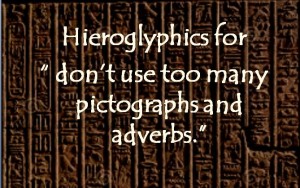“Most people who bother with the matter at all would admit that the English language is in a bad way, but it is generally assumed that we cannot by any conscious action do anything about it.”
 Some things never change. That statement is the opening line of George Orwell’s “Politics and the English Language” written in 1946. It’s a 10-page single-spaced censure of poor political and academic writing.
Some things never change. That statement is the opening line of George Orwell’s “Politics and the English Language” written in 1946. It’s a 10-page single-spaced censure of poor political and academic writing.
And because his polemic is an old one—it wouldn’t be surprising if they find hieroglyphics with a similar rebuke—I decided to blog about my few favorite lines and share his enduring writing tips.
“Our civilization is decadent and our language—so the argument runs—must inevitably share in the general collapse.”
-
OMG and LOL! How might Orwell react if he were to travel in in the Tardis with Dr. Who to witness today’s language transgressions.
“[The English language] becomes ugly and inaccurate because our thoughts are foolish, but the slovenliness of our language makes it easier for us to have foolish thoughts.”
-
Mind you, this was before we had 500 channels to choose from and yet “reality” TV is all the rage.
“The point is that the process is reversible. Modern English, especially written English, is full of bad habits which spread by imitation and which can be avoided if one is willing to take the necessary trouble.”
-
Ah, there’s the rub! And the cry of every teacher of language and literature heard around the world. The writer’s challenge: Using mere words to convey a specific emotion, setting, idea, subject, object, belief, personality etc that is understandable to the reader. It takes a lot of “necessary trouble.” Writers, editors, and teachers call is rewriting and editing.
But there’s a solution to tragic writing!
Orwell lists the common and correctable problems:
Dying metaphors: “A newly invented metaphor assists thought by evoking a visual image.” Most writers no longer understand the hackneyed metaphors they are using. Orwell’s examples of metaphors that have “been twisted out of their original meanings” include, ride roughshod over, stand shoulder to shoulder, Achilles’ heel, swan song, and toe the line” which he states is “sometimes written as tow the line.”
Operators of verbal false limbs: (Love this metaphor!) “These save the trouble of picking out appropriate verbs and nouns, and at the same time pad each sentence with extra syllables which give it an appearance of symmetry.” Using a phrase when a simple verb will do. Examples include ” render inoperative, be subjected to, give rise to, have the effect of, exhibit a tendency to..”
-
Flames shoot from my eyes when I read these ‘false limbs’ in student papers.
Pretentious diction: “…used to dress up a simple statement and give an air of scientific impartiality to biased judgments.” Where would politicians be without all that pretentious politically-correct rhetoric?
Meaningless words: “In certain kinds of writing, particularly…literary criticism, it is normal to come across long passages which are almost completely lacking in meaning.” This refers to jargon, vague, or ‘in’ words that are used in a consciously dishonest way.
-
We have grown so familiar and possibly anesthetized by meaningless words that we accept them, assuming they mean what we want them to mean.
-
A favorite personal example is when a student writes, “We, as humans…” As opposed to what, I ask. There’s no aliens in class from other worlds—that I know of.
Orwell provides an example of a well-written passage ( taken from Ecclesiastes in the Holy Bible)
I returned and saw under the sun, that the race is not to the swift, nor the battle to the strong, neither bread to the wise, nor yet riches to men of understanding, nor yet favor to men of skill: but time and chance happen to them all.
His bombastic re-wording.
“Objective considerations of contemporary phenomena compel the conclusion that success or failure in competitive activities exhibits no tendency to be commensurate with innate capacity, but that a considerable element of the unpredictable must invariably be taken into account.”
Huh?
Another example: In my opinion it is not an unjustifiable assumption that instead of I think.
Orwell suggests that a “scrupulous” writer will ask himself the following questions for every sentence he writes.
- What am I trying to say?
- What words will express it?
- What image or idiom will make it clearer?
- Is this image fresh enough to have an effect?
- Could I put it more shortly?
- Have I said anything that is avoidably ugly?
Orwell also offers the following rules for writers.
1.Never use a metaphor, simile, or other figure of speech which you are used to seeing in print.
2. Never use a long word where a short one will do.
3. If it is possible to cut a word out, always cut it out.
4. Never use a foreign phrase, scientific word, or a jargon word if you think of an everyday English equivalent.
5.Break any of these rules sooner than say anything outright barbarous.
Some writing tips are timeless.















